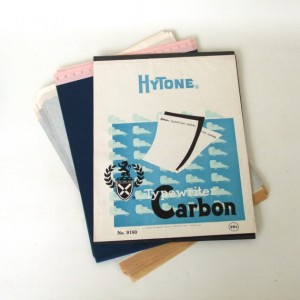When I first started work on Capitol Hill in the 1970s, we used three colors of carbon paper to file and cross-reference every outgoing snail-mail letter. We filed the pink copies by date, yellow by issue, and green by constituent name. It was considered very efficient in days when Senators routinely received 1000 letters a day, and teams of correspondents answered them on typewriters. One of the big debates that year in Congress was about renewable energy and high gas prices. My how (some) things change.
 Office systems change (computers do both the mailing and the filing), and we change with them. An efficient office stays on top of these trends, and most of us embrace the latest in personal technology, just as Congress must constantly address changes in global technology. Consider the craze during those years to switch our energy use to renewable sources that would wean us from a dwindling supply of oil and gas. We now know that our supplies are not dwindling, and the U.S. is today the biggest oil and natural-gas producer in the world (14 million barrels a day).
Office systems change (computers do both the mailing and the filing), and we change with them. An efficient office stays on top of these trends, and most of us embrace the latest in personal technology, just as Congress must constantly address changes in global technology. Consider the craze during those years to switch our energy use to renewable sources that would wean us from a dwindling supply of oil and gas. We now know that our supplies are not dwindling, and the U.S. is today the biggest oil and natural-gas producer in the world (14 million barrels a day).
Yet while office technology changes overnight, energy policy is mostly dictated by government, which changes only at a snail’s pace. The national Renewable Fuels Standard (RFS) is a prime example. It is big news again this year because it is an important issue in Iowa, and several presidential candidates support phasing it out. That alarms many corn farmers and ethanol producers who depend on the artificial market created by government regulations, which require ethanol to be blended into gasoline. Sometimes Iowa voters get angry about it, but before candidates pander, they ought to remember the nation’s taxpayers.
Under the RFS, corn ethanol is blended into gasoline to reduce imports of foreign oil and greenhouse gas emissions (GHGs). Back when gasoline demand was soaring, Congress wanted to replace a portion of the U.S. gasoline supply with homegrown fuels. So the RFS seemed like a good idea at the time, but advances in technology soon overwhelmed it. Foreign oil imports dropped substantially when hydraulic fracturing and directional drilling increased domestic oil production, and efficiency improvements in cars and trucks reduced gasoline demand. Modern cars sip gasoline compared to the guzzlers of the past.
But with the RFS still on the books, the Environmental Protection Agency (EPA) has continued to order ever-higher volumes of homegrown fuels into gasoline and diesel. This year 14.5 billion gallons of ethanol are supposed to be blended into fuel (the largest amount ever), even though the mandate no longer makes sense economically or technologically. Rather, it has become an out-of-date and expensive debacle that forces everyone to pay more.
The Institute for Energy Research says the RFS has cost consumers an estimated $83 billion in higher fuel costs. Ethanol, which has an affinity for water and can lead to corrosion, also has harmed older vehicle and marine engines as well as tractors and outdoor equipment like lawnmowers and snow blowers. Ethanol contains less energy than straight gasoline and gets fewer miles to the gasoline, so many drivers have switched back to straight gasoline – sales of straight gasoline nearly doubled in the last 2 years.
Moreover, corn ethanol may actually be more damaging to the environment than gasoline. Although the EPA trumpets ethanol’s GHG-reducing attributes, Environmental Working Group (EWG) calculations indicate it has encouraged farmers to plow up wetlands and grasslands to plant more corn and soybeans, emitting millions of tons of GHGs into the air. In October, the EPA’s own Inspector General launched an investigation, and many scientists have begun to question the environmental impacts of ethanol.
So how does the EPA react to our evolving understanding? By sharply increasing the mandate for advanced cellulosic fuels. This year 230 million gallons of these advanced fuels are supposed to be added to the nation’s transportation fuels, at least seven times more than is actually produced in America. Cellulosic fuels are similar to ethanol, but produced from wood, brush, and grasses. They are far more difficult and costly to produce than imagined.
The EPA’s absurd efforts to keep the RFS alive remind me of out-of-touch office workers still looking for better colors of carbon paper. Congress should repeal the RFS before it inflicts more damage to the environment and our wallets.
That doesn’t mean we are unsympathetic to corn farmers and ethanol producers. Like all businesses, they have to make a living, and that is especially difficult for farmers these days. But they will continue to sell ethanol because it is an effective octane enhancer for gasoline, and there will always be a market for it. But the volume should be determined by the market, not by obsolete government edicts, in triplicate or otherwise.
(A version of this column originally appeared in the Grand Junction Sentinel, January 22, 2016)




Comments on this entry are closed.